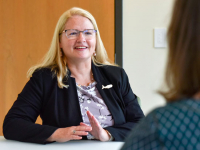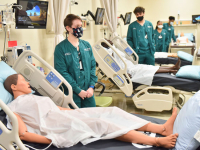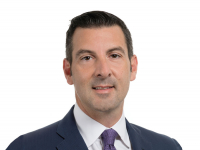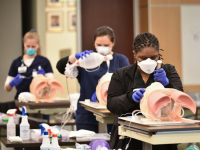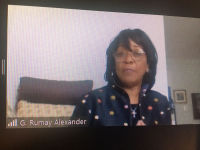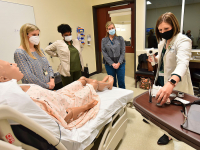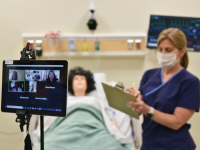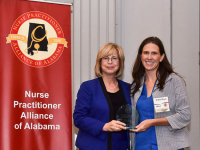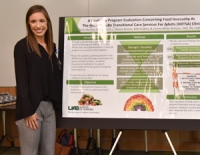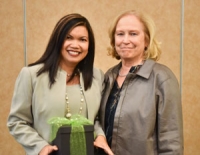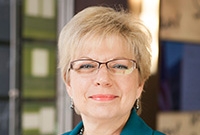
By Laura Gasque
Joy Deupree, PhD, MSN, CRNP, WHNP-BC, FAAN (BSN 1994, MSN 1997), has 29 years of experience as a nurse and has been a board-certified women’s health nurse practitioner for 26 years. Throughout her career, she has been engaged in health policy advocacy, research and educational efforts at both the state and national levels for health literacy and women’s health, and she is widely recognized for her advocacy for populations that face challenges with understanding health care information. Deupree, who was on faculty in the School from 1999 until her retirement in 2019, returned full-time to the School to co-lead with Dean and Fay B. Ireland Endowed Chair in Nursing Maria R. Shirey, PhD, MBA, RN, NEA-BC, ANEF, FACHE, FNAP, FAAN, the Health Policy arm of the new Leadership and Health Policy Initiative.
1. You’ve been actively involved in policy change for nurse practitioners in Alabama since 1994. What was it about leadership in health policy that interested you?
I grew up in a family that regularly engaged in the political process. My grandfather was an elected official at the state level, so I was naturally interested in policy from an early age. When I graduated from UAB in 1994, I joined the Alabama State Nurses Association and volunteered for the legislative committee. This was during a time that many advancements for policy related to advanced practice nurses were taking place. In 1995, the Alabama legislature declared that the regulation of APRNs was essential to protect the public and I was with the ASNA coalition the day we gathered in Governor Fob James’ office for the signing of this bill.
As a new graduate when starting my first job in a rural hospital, I realized that few nurses understood they could have a voice, did not understand policy and unfortunately, many were afraid to speak up to advocate for change out of fear of retaliation from employers. These experiences set me on this nursing health policy advocacy pathway, and I’ve never looked back.
2. How do you advocate for nurses at the state and national levels? Describe your role.
I have found I must be prepared to seize the moment and when an opportunity arises, be prepared to answer questions regarding the who and why of the need for policy change. At the state level, I actively work with numerous groups to provide education on the decorum expected of any professional engaging with an elected official or influential leader who can advance policy. To achieve change at the national level, it is often about being at the right place, with the right people, at the right time. Some efforts take years of work to make advancements. I’ve also learned that the more controversial the policy change, the harder it is to achieve success. When this occurs, you must advocate for common ground that benefits patients and be willing to compromise on your “ask” for the policy change or advancement.
3. Tell us about a time when your advocacy work made an impact.
The legislative success I am most proud of, and I think is the most important to date, is the bill that granted prescriptive authority for controlled substances to nurse practitioners and nurse midwives that was passed by the Alabama legislature in 2013. The difference this made was profound, especially for the rural areas of Alabama. More than seven years of advocacy work led by the Nurse Practitioner Alliance of Alabama, along with countless individuals working together in association with other health care professions to find common ground for compromise, led to the passage of this bill. Removal of this one barrier paved the way for physicians to have more nurse practitioners working for them which expanded access to care in the rural areas and to patients who previously had to travel hours to get a prescription filled. Because of this bill, they were able to see a local provider for their needs. Before the bill passed, there were approximately 2,000 nurse practitioners in collaborative agreements in Alabama. Within three years of its passage that number had more than doubled, and today there are more than 7,000 nurse practitioner collaborative practices in the state.
4. What’s your best advice for nurses wanting to be involved in policy work?
Join your professional association and support those who are working on behalf of your profession to advance policy. Not everyone feels comfortable advocating in person with elected officials and influential leaders, but everyone in a profession has a salary and can join a group, and through donations support those leading grassroots efforts.
5. What are some of your goals in your new role at the School?
I am humbled by the many opportunities I have been given to advance my professional career to make a difference for others and I want to pay it forward and mentor the next generation of nurse leaders. Strong leadership at the local, state and national levels is imperative for nurses to have the voice they deserve and advance policy to properly care for the patients and families they serve. In most cases, nurses spend more time with a patient and their families than any other profession. Often, however, they are not included in the decision- making process at the leadership level to influence change. My goal is to advance the knowledge, confidence and effectiveness of future generations of nurses, so they have a seat at the table and feel confident in their ability to influence change.









































